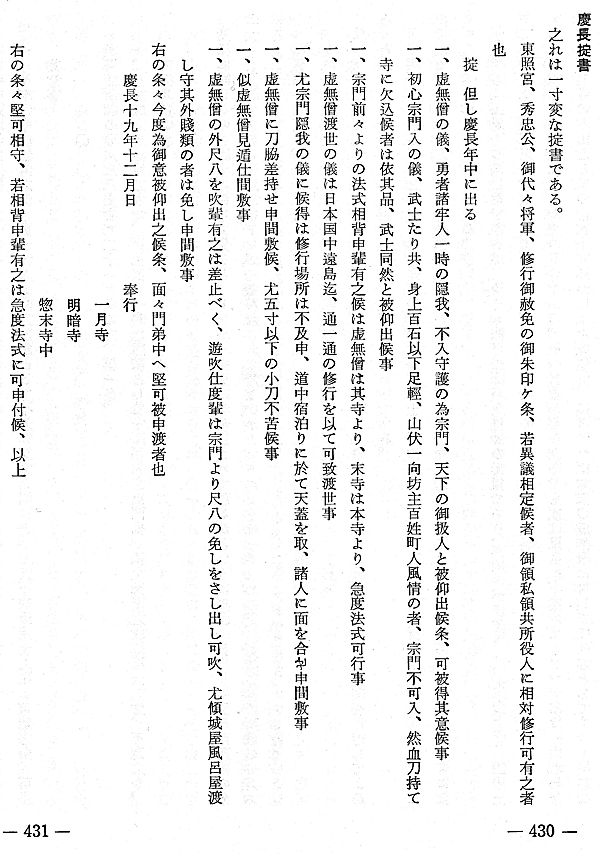|
1751?: The Problematic 'Keichō 19' (1614) 'Komusō' Scripts:
The Many Different All Fabricated Versions
慶長之掟書 - KEICHŌ no OKITEGAKI
1751: The "Keichō Period Edict"
Dating: 'Komusō' Shakuhachi traditionalists devotedly believe that this strange document was actually originally issued and signed in 1614,
Keichō 19, by Shōgun Tokugawa Ieyasu, himself.
That is simply impossible, only wishful thinking.
Nothing but a fully fabricated "myth" - a sheer, yet also somehow cunning act of history falsification.
Do observe, as a fact, that Ieyasu's name is not even mentioned anywhere in any of the many versions of that fully fabricated "document"!
Neither do you see the term 'Fuke-shū' mentioned in any of the many versions of that deceptive document.
According to the Japanese shakuhachi historian Yamato Hōmei, the oldest version of this definitely fabricated document was created and appeared only as late as in 1751,
Hōreki Period Year 1.
Link to webpage in question:
Yamato Hōmei's critical webpages
Moreover, acc. to japanologist Max Deeg, the oldest "attested" version of a Keichō no okitegaki document can be dated only as late as 1792! Deeg, 2007, p. 27.
NB!
It is essential to observe and acknowledge this fact: That the Japanese characters
普化宗, Fuke-shū, in English: the "Fuke Sect",
do not at all appear in any of the many known, surviving and published versions of the Keichō no okitegaki.
In the English translation presented below of a 9 article version of the document, in par. 6, Takahashi Tōne mistakenly "translates"
宗門諸派, shūmon shoha,
"all the congregation's factions", as "the Fuke-shū".
Which is certainly not correct. Yet another mistranslation and misinterpretation - perhaps deliberate? :-)
御入国 之節 被仰渡 候 御掟書
(ごにゅうこく のせつ おおせ わたされ そうろう おんおきてがき)
GO-NYŪKOKU no SETSU ŌSE WATASARESŌRŌ O-SADAMEGAKI
“Decree About Bestowing Entrance to the Different Provinces”
Known Editions & Published Versions
8 PARAGRAPH printed version presented by NAKATSUKA CHIKUZEN
In: Nakatsuka 1979, pp. 430-431

8 PARAGRAPH digitized and commented online version presented by YAMATO HŌMEI
Link: Yamato Hōmei website
一 虚無僧の儀は、勇士浪人一時の隠れ家となし、守護入れざるの宗門。よりて天下の家臣諸士の席、定め置くべきの条、その意を得べき事。
(虚無僧は、勇士が浪人をして仕官先を探し当てるまでの一時の隠れ家とする身分で、幕府の警察権の及ばない宗教団体である。従って、虚無僧は武士と同じ資格を持つものと定められていることを理解すること。)
一 虚無僧、諸国行脚の節、疑わしき者見掛け候ときは、早速召し捕らえ、その所へ留め置き、国領はその役人へ相渡し、地領代官所はその村役人へ相渡し申すべき事。
(虚無僧は、諸国行脚の際に、疑わしい者を見つけた時は、捕まえて役人に引き渡す任務と権限を持つ。これがいわゆる「公儀御用」でしょう。)
一 虚無僧の儀は、勇士の兼帯なる為、自然敵など相尋ね候旅行、依て諸国の者、虚無僧に対し、麁相(そそう)慮外の品、または托鉢に障り、むつかしき儀出来候節は、その子細を相改め、本寺まで申し達すべく候。
本寺に於いて相済まざる儀は、早速、江戸奉行所へ告げ来るべき事。
(虚無僧は敵討ちのために旅行していることもあるので、諸国の者は虚無僧に対して粗略な扱いをしたり、托鉢の邪魔をしてはいけない。)
一 虚無僧止宿は、諸寺院あるいは駅宿の役所へ旅宿いたすべき事。
(虚無僧は諸寺院や駅宿の役所へ宿泊すること。逆に言えば、無料で宿泊できるということでしょう。)
一 虚無僧の法冠は猥(みだ)りに取るべからざるものと、万端心得べき事。
(虚無僧の法冠(天蓋)は、みだりに取ってはいけない。逆に言えば、顔を隠して天下を通行できる。)
一 尋ね者申し付け候節は、宗門諸流、丹誠をぬき抽んずべき事。
(幕府がお尋ね者を捜す仕事を命じた時は、虚無僧諸流派は誠意を持って励むこと。これも「公儀御用」。)
一 虚無僧、敵討ち申したき者これあるは、吟味を遂げ、兼ねて本寺に断り、本寺より訴え出すべき事。
(虚無僧で、敵討ちをしたい者があれば、許可を申し出ること。)
一 諸士血刀を提げて寺内に駆け込み、願を依る者は、その起本を問うて抱え置くべし。もし弁舌を以て申し掠める者これ有らば、早速訴え出づべき事。
(武士が血刀を持って虚無僧寺に駆け込んできたら、事情を確かめて保護すること。)
9 PARAGRAPH printed version presented in TOKUGAWA KINREIKŌ
Originally compiled and eventually published in 1890 (-1895) by the Japanese Ministry of Justice (Shihōshō, 1871-1948)
In: Tokugawa kinreikō, Book 5, Maki 41, 1932, pp. 106-107.
Link - go to frame 61: National Diet Library,
Tokyo: Tokugawa kinreikō, Book 5

9 PARAGRAPH digitized online version presented by IIDA KYOREI
Source acc. to Iida Kyorei: Tokugawa kinreikō
Link: Iida Kyorei website
御入国之節披仰渡候御掟書
1.虚無憎之儀者、勇士浪人一時之隠家、不入守護之宗門、依而天下之家臣諸士之席、可定置之条、可得具意事
1.虚無僧取立之儀者、諸士之外、一向坊主百姓町三人下具長之者不可取立事
1.虚無僧諸国行脚之節、疑敷者覚掛候時者、早連召捕耳所江留置、国領は其役人江相渡、地領代官所者其村役人江相渡可申事
1.虚無僧之儀者勇士為兼帯、自然敵杯相尋候旅行。依而諸国之者、対虚無僧、相慮外之品、又者、托鉢之障六ケ敷儀出宋候節は其子細相改、本寺迄可申達於本寺不相済儀者、早連江戸奉行所江可告来事
1.虚無僧冠ニ不可取者と万端可心得事
1.尋者申付候節は宗門諸派可抽丹誠事
1.虚無僧敵討申度者於有之者、逐吟味、兼而断本寺、従本寺可訴出事
1.諸士提血刀、寺内駆込依頼者、具問記本、可抱置、若以弁舌、中掠者於有之は早連可訴出事
1.本寺宗法出置、其段無油断、為相守、宗法相背者於有之は急度宗法可行事
右之条々堅相守、武門之正道不失、武者修行之宗門と可心得者也、為其、日本国中往来自由差免置所、決定如件。
慶長19年 申寅 正月
本多上野介(印)
板倉伊賀守(印)
本多佐渡守(印)
虚無僧寺江
9 PARAGRAPH digitized and commented online version presented by YAMAGUCHI RAIMEI
Link: Yamaguchi Raimei website
御入国之節被仰渡候御掟書(ごにゅうこくのせつおおせわたされそうろうおんおきてがき)
一 虚無僧之儀者勇士浪人一時之爲隠家不入守護之宗門依而天下之家臣諸士之席可定置之條可得其意事
(虚無僧の儀は勇士浪人一時の隠れ家、不入守護の宗門となす。よって天下の家臣、諸士の席、これを定め置くべきの条、その意を得べきこと)
一 虚無僧諸國取立之儀者諸士之外一向坊主百姓町人下賤之者不可取立事
(虚無僧諸国取り立ての儀は、諸士のほか、一向坊主、百姓、町人、下賤の者取り立つべからざること)
一 虚無僧諸國行脚之節疑敷者見掛候時者早速召捕其所江留置國領は其役人江相渡地領代官所者其村役人江相渡可申事
(虚無僧諸国行脚の節、疑わしき者見かけ候時は、早速召し捕り、その所へ留め置き、国領はその役人へ相渡し、地領代官所はその村役人へ相渡し申すべきこと)
一 虚無僧之儀者勇士爲兼帶自然敵抔相尋候旅行依而諸國之者對虚無僧麁相慮外之品又者托鉢之障六ヶ敷儀出来候節ハ其子細相改本寺迄可申達於本寺不相濟儀者早速江戸奉行所江可告来事
(虚無僧の儀は勇士にして、兼帯をなし、自然敵など相尋ね候旅行、よって諸国の者虚無僧に対し、麁相(そそう)慮外の品、又は托鉢の障りむつかしき儀出来候節は、其の子細相改め本寺まで申し達すべし、本寺において相済まざる儀は早速江戸奉行所へ告げ来たるべきこと)
一 虚無僧法冠猥ニ不可取者ト萬端可心得事
(虚無僧の法冠、みだりに取るべからざる者と万端心得べきこと)
一 尋者申付候節ハ宗門諸派可抽丹誠事
(尋ね者申し付け候節は、宗門諸派、丹誠を抽(ぬき)んずべきこと)
一 虚無僧敵討申度者於有之者遂吟味兼而斷本寺從本寺可訴出事
(虚無僧、敵討ち申したき者これ有るにおいては、吟味を遂げ、かねて本寺に断り、本寺より訴え出ずべきこと)
一 諸士提血刀寺内驅込依願者其問起本可抱置若以辯舌申掠者於有之ハ早速可訴出事
(諸士、血刀を提げ、寺内駆け込み願いを依す者、その起本を問ひ、抱え置くべし、若し弁舌を以て申し掠める者これあるにおいては、早速訴え出ずべきこと)
一 本寺宗法出置其段無油斷爲相守宗法相背者於有之ハ急度宗法可行事
(本寺宗法出し置き、その段油断無く相守らせ、宗法相背く者これあるにおいては、急度(きっと)宗法行うべきこと)
右之條堅相守武門之正道不失武者修行之宗門ト可心得者也爲其日本國中往來自由差免置所決定如件
(右の条、堅く相守り、武門の正道失はず、武者修行の宗門と心得べきものなり、そのため日本国中往来自由差し免じ置く所決定くだんのごとし)
慶長十九年甲寅正月
本多上野介
板倉伊賀守
本多佐渡守
虚無僧寺江
9 PARAGRAPH version translated into English by TAKAHASHI TONE
Presented in Takahashi, 1990, pp. 55-56.
"1. The komusō fraternity is a religious group specifically designed to serve the needs of rōnin and samurai who wish to withdraw temporarily from the world.
The temples of the komusō do not pertain to the jurisdiction of the authorities in which they are located. Furthermore, they are reserved only for the samurai.
2. Besides samurai, ordinary priests and people belonging to the lower ranks, such as peasants, traders or humble people, are not allowed to become komusō.
3. If a komusō chances upon a suspicious individual, he has the right to arrest him and deliver him to the local authorities.
4. A komusō is a samurai. Therefore during his pilgrimages he pursues his enemies.
To this purpose, the local people should allow him to practice takuhatsu freely and offer him every assistance..
If someone causes his inconvenience, he should denounce him to the local komusō temple; if the grievance is not settled there,
the komusō should report to the Bugyō-sho [the office of the Tokugawa-shōgunate that oversaw the affairs
of Buddhist temples and Shinto shrines] in Edo.
5. A komusō should never remove his tengai [straw hood] without a serious reason.
6. The temple authorities and all members of the Fuke-shū* should assist in every way a komusō who is pursuing an enemy of the bakufu.
7. A komusō, prior to killing an enemy, has to receive permission from the parent temple.
8. When a samurai enters the temple's grounds carrying a sword dripping with blood, he should first be interrogated by the temple's authorities,
prior to be given refuge.
If his reasons are plausible, he should be given shelter; in the opposite case, he should be denounced to the authorities.
9. The parent temple issues the rules, and everyone should abide by them. Whoever disobeys should be punished.
Remember! This is a religious sect for the bushi. Respect and abide by its rules! Do not forget the correct way of the samurai!
Hence you are granted unlimited freedom to travel throughout the country."
* Comment by T.O.: Do note that the term Fuke-shū, as here in Takahashi Tone's translaton, does not appear at all
in any of the known versions of the Keichō no okitegaki!
10 PARAGRAPH version presented owned by NAIKAKU BUNKO LIBRARY/National Archives of Japan

10 paragraph version of the 'Keichō no okitegaki'
Kokuritsu Kōbun Shokan/National Archives of Japan:
Naikaku Bunko Library/Cabinet Library, Japan
In Ueno, 2002, p. 209
11 PARAGRAPH version presented by WIKIPEDIA.org
Link: WikiPedia, Japan
御入国之砌被仰渡候御掟書
一、虚無僧之儀者勇者浪人一時之隠家不入守護之宗門依而天下家臣諸士之席可定置之条可得其意事。
一、虚無僧諸国取立之儀者諸士之外一向坊主百姓町人下賎之者不可取立事。
一、虚無僧諸国行脚之節疑敷者見掛侯時者早速召捕其所江留置国領は其役人江相渡、地領代官所者其村役人江相渡可申事。
一、虚無僧之儀者勇士為兼帯自然敵杯相尋侯旅行依而諸国之者対虚無僧粗相慮外之品又者托鉢に障六ヶ敷義出来侯節ハ其子細相改本寺迄可申達於本寺不相済義者早速江戸奉行所江可告来事。
一、虚無僧止宿者諾寺院或者駅宿村々役所に可旅宿事。
一、虚無僧法冠猥に不可者ト万端可心得事。
一、尋者申付侯節ハ宗門諸流可抽丹誠事。
一、虚無僧敵対申度者於有之者遂吟味兼而断本寺従本寺可訴出事。
一、虚無僧常々木太刀懐剣等心掛所持可致事。
一、諸土提血刀寺内へ駈込依頼者其間起本可抱置若以弁舌申掠者於有之老早速可訴出事。
一、従来宗法出置其段無油断為相守宗法相背者於有之急度宗法可行事。
右の条々相堅守武門之正道不失武者修業之宗門ト可心得者也為其日本国中往来自山差免置処決定如件。
慶長十九年申寅正月
本多上野介
板倉伊賀守
本多佐渡守
1816, at the latest
17 PARAGRAPH version presented by Iida Kyorei
Link: Iida Kyorei: Kinko no techō
琴古手帳所載分
家康公御定
1. 日本国中虚無僧之儀、勇士浪人一時之隠家として不入守護之宗門によって天下家臣諸士之席に可定之条可得其意事
1. 本寺江宗法出置候、其段無油断相守可申候、若相背者於有之は末寺は本寺より、虚無僧は其寺より急度宗罰行べき事
1. 虚無憎之外、尺八を吹申者於有之は急度指留可申候尤懇望之輩は本寺より尺八之免し出し為吹可中候、勿論諸士の外下賎之勿論江一切尺八を為吹申間敷候尤虚無僧之姿為致間敷候事
1. 虚無僧多勢集り逆意を申合者於有之には急度遂吟味本寺並に番僧に至迄重罰たるべき事
1. 虚無僧托鉢修行之節、同行弍人之外許不申事
1. 虚無僧渡世之儀は、諸国所々巡行専と仕由、其段指許申候遍歴修行之内、於諸国に国法杯と申、虚無僧末、慮外之体、又は托鉢等に障六ケ敷儀出来候はば子細を改、本寺江申達、於本寺不相済儀は早速江戸奉行所江可告来候事
1. 虚無僧托鉢に能出或は道中宿往未所々何方にても天蓄を取、諸人江面を合せ中間敷事
1. 虚無僧托鉢之節、刀脇差並武具類一切為持申間敷、惣而いかっケ間敷なりかたち致間敷、尤壱尺下の刃物為懐剣差免可申候事
1. 虚無僧之儀は勇士之道、敵体尋、廻国杯之儀も有之によって芝居渡舟等に至迄、往来自由指免候事
1. 似虚無僧於有之は急度宗法可行、若又賄賂を以見逃など致さば番僧に致迄、可為重罪、忽而無之様可申付候事
1. 托鉢に罷出下賎之者之痛をかえりみず托鉢不可致、勿論弁舌を以道興賄賂預饗応堅停止、惣而正道、一巳之慎無者、本則取上可申事
1. 虚無僧自然互に敵に候はば逐吟味還俗申付、寺内において勝負可為致候勿論諸士之外一切不指免候、贔屓層を以、片落なる取扱堅停止之事
1. 諸士人を切、血刀を提寺内江逃人候共留置、子細を改、不寄何事、武士道に候はば宗法可士候、たとへ武士たりとも科ある人は一切隠置申間敷候、若隠置、其罪後日に顕は難逃儀に付早連縄懸させ差出可申事。
1. 虚無憎に罷成、敵討申度著於有之は其段子細相改指免可申、併ながら多勢集申間敷候、同行人壱人は免可申候、尤諸上之外一切不指免事
1. 往来之節馬駕篭一切無用、所々関所番所にては無沙汰無之様、本寺より之本則往未出し相改させて通可申事
1. 住所を離、他国所々城下並町托鉢修行連留、一日之外堅無用、若鳴物停止等告来行はば宗門伝学之虚霊之外吹申問敷事
1. 虚無僧之儀は天下之家臣請士之席に相定候上は常に武門之正道を不失、何時に而も還俗申付候間、表には僧之形を学、内心に而は武者修行之宗法と可心得者也、為其、曰本国之往来自由指免置候様に決定如件。
右上意之趣相渡申間、奉拝見、会合之節能く為申聞、可被相守者也。
慶長19年 戊寅 正月
本多上野介
板倉伊賀守 在判
本多佐渡守
虚無僧本寺江
1819
12 PARAGRAPH version presented by Yoshida & Kobayashi
of "The Arashiyama Society for the Reading of Old Texts",
嵐山町の古文書を読む会,
located and operating in Ranzan City, Saitama Prefecture, NW of present Tōkyō.
Link: www.ranzan.cocolog-nifty.com
普化宗門御掟書写
文政二年(1819)
吉田・小林武良家文書№128
- - -
文政弐辛年
普化宗門御掟書写
卯正月吉祥日
- - -
御入国之砌被仰渡候御掟書写
一 虚無僧之義者勇士浪人一時之為隠家不入守護
宗門依天下家臣諸士之席ニ而可定之条可得其定事
一 虚無僧取立之儀者諸士之外坊主百姓町人下賎之者
不可取立事
一 虚無僧諸国行脚之節疑敷者見懸之時ハ早速
召捕其所へ留置国領ハ其村役人江相渡地領代官
所者其村役人江相渡可申事
一 虚無僧之儀者勇士為兼帯自然敵抔相尋旅行
依而諸国之者対虚無僧麁末慮外品又ハ托鉢ニ
障リ六ケ敷義出来之節ハ其子細相改本寺迄可申達
於本寺不相済義ハ早速江戸奉行所へ可送来事
一 虚無僧之義止宿者諸寺院或者駅宿村々役所江
可致旅宿事
一 虚無僧法冠猥リニハ不可取者ハ万端可心得事
一 尋者申付候節者宗門諸流可細丹誠事
一 虚無僧敵討申儀者於有之ハ懸吟味兼而本寺
被断本寺纏可訴出事
一 諸士提血刀寺内江逃込依頼者其向為知本寺可抱
置若弁舌を以申掠候者有之者早速可訴出事
一 虚無僧常々木大刀懐剣心懸可致所持事
一 本寺宗法出置其段無油断為相守宗法相背者於有之
者宗法可行事
一 此度被仰出為上意之趣堅可相守
右條々堅相守武門之正道不異武者修行宗門与
可心得者也為其日本国中往来自由差免置候処
決定如件
慶長十九甲寅年正月
本多上野介○印
板倉伊賀守○印
本多佐渡守○印
虚無僧本寺江
21 PARAGRAPH version reprinted in the book Shakuhachi dokushū annai,
"A Guide to Shakuhachi Self-study", edited by Inaba Issui, Fuke Kyōkai, Tokyo, 1915, pp. 11-15
Link: Sadame, in Shakuhachi dokushū annai



21 PARAGRAPH version translated into English by TAKAHASHI TONE
Presented in Takahashi 1990, pp. 64-67.
"SADAME
1. The Japanese komusō fraternity is a religious group specially designed to serve the needs of ronin and samurai who wish to withdraw temporarily from the world.
The temples of the komusō do not pertain to the jurisdiction of the authorities in which they are located.
They are reserved only for the samurai.
2. When the parent temple issues the rules, everyone should abide by them.
A komusō who belongs to a sub-temple will receive penalization from the parent temple.
3. When a komusō performs itinerancy, he is obeying the laws of his sect.
Therefore, he must be allowed to do it freely.
4. When a komusō is practising takuhatsu in a foreign land, the town’s people cannot molest him according to the laws of that land.
If the komusō is prevented from doing takuhatsu, he should report to the main temple.
If the main temple is not able to handle the matter, it should be reported as soon as possible to the Edo Bugyō.
5. During a komusō’s pilgrimages, within the streets or in the lodging places, he is not to remove the tengai and show his face.
6. A komusō should not carry arms during his takuhatsu.
He is allowed to have a dagger shorter than one shaku (30.3 cm.) and to hide it in his clothing.
7. A komusō is also a samurai who pursues his enemies during his pilgrimages.
He, therefore, should be given free admission to shibai [plays], etc., and be exempted from toll fees and boat fares everywhere he goes.
8. The bansō [priest keeper] should be sent to all the country, to supervise komusō behavior.
9. If the bansō discovers a false komusō during his expeditions, he should deal with him according to the laws.
If the bansō agrees to be bribed and sets the false komusō free, he, as well as the false komusō, will be rigorously punished.
Therefore, be on guard and behave yourself!
10. No one is allowed to play the shakuhachi besides a komusō.
If a samurai desires to play the shakuhachi, he should obtain permission from the main temple.
Only samurai are allowed to play shakuhachi and become komusō.
11. If a komusō becomes aware of a komusō conspiracy, he should report it at once to the authorities.
The participants, including the main temple and the bansō, will be punished severely.
12. When a komusō is practicing takuhatsu, he may have with him no more than one fellow komusō as his mate.
13. A komusō should not extort donations or lodging accommodation from the poor.
In addition, feasts, banquets and ... [missing characters].
14. When a komusō chances upon one of his enemies, they should both agree to ask for permission from the main temple to be relieved from their komusō status.
They should duel on the temple’s grounds.
The duelers are not allowed to received any external reinforcements.
Only samurai are allowed to behave thus.
15. If a samurai enters the temple’s grounds carrying a sword dripping with blood, the temple authorities should first interrogate him, and then offer him refuge.
If a samurai has precedents, he should not hide his past deeds, because if his sins are made known in the future, he will no longer receive protection from the temple.
16. A komusō may kill his enemies but is not allowed to participate in group fighting.
He is allowed to have only one fellow komusō with him during the fight.
Only samurai are allowed to behave thus.
17. A komusō is not allowed to ride a horse or use a palanquin during his itinerancy, in order to avoid facing too many people.
18. When a komusō arrives at the borderland of a country, he should politely demonstrate his credentials which were given by the main temple
and be allowed to pass freely.
If a komusō avoids passing by the official checkpoint, he should be interrogated.
Be prudent and respect the regulations!
19. When a komusō practices takuhatsu outside his territory in a castle town, he should not stay there for more than seven days.
During his takuhatsu practice he should never play secular music or popular tunes.
He is not allowed to participate in any artistic activities.
20. When a komusō is practicing takuhatsu, he should not use a shakuhachi that is shorter than one shaku (30.3 cm)
and eight sun (1/10 of shaku) in length, nor play different pieces than those prescribed.
21. Komusō discipline has been established for all samurai under the sun.
Do not forget the right path of chivalry, because at every moment a komusō can again become a samurai.
Remember that this is a religious sect for the bushidō.
Hence you are granted to travel freely throughout the country."
<1--
-->
|
|






